| dc.description.abstract | The research deals with effects of the institutional teacher reward systems on students’ performance in Kenya Certificate of Secondary Education in Rongo District. The study found out the schools’ management use of monetary rewards on teachers towards students in KCSE performance 25 out of 34 respondents agreed that it influences ,teachers benchmarking trips and student’ performance showed that 29 out of 34 respondents agreed it influences students performance, with individual and teachers group based rewards the results showed that 26 out of 34 agreed it influences students performance and teachers promotions and students performance 20 out of 34 respondents agreed it influences. The research was conducted using descriptive survey. The study used questionnaires as the main research instrument in collecting data with target population of 11 Principals, 11 deputy principals and 22 teachers in 11 secondary schools in Rongo District of Migori County. The study revealed that there exist a link between teachers’ bench marking trips and institutional rewards and students’ performances. This shows that the schools’ investments in bench marking trips and rewards directly contribute to improved student performances. There is thus a great need to increase the rewarding and bench marking trips in any organization to boost the teachers’ performance hence improvements in students’ performance. As society moves toward holding teachers accountable for students’ performances, it is paramount to explore the factors that motivate teachers. The “what” that motivates teachers may very well vary from one school to another, or one department to another; yet motivation as a construct is an important element to study when looking at the quality of teaching. Various education programmes are varied, but the success of these programmes, given student achievement is the product, heavily lies within capabilities of the teachers. Once the classroom doors close, the question often arises regarding whether or not teachers are motivated to do their best possible work in order to produce the highest quality students. Various scholars argued that minus motivated teachers, the search for excellence is in vain. The excellence that is referred to in the aforementioned statement is that of the students. Therefore, crux of the problem lies in the fact that it teachers are unmotivated, and then the students that they teach will also be unmotivated. A further explore into this statement implies that suppose the motivational needs of teachers are never met, the whole educational system fails. The analysis shows that motivation among teachers is paramount for their performances in the classrooms and the overall academic development. Thus, according to the analysis, to achieve the learning objectives and reach a reasonable standard, educational institutions should keep a close tab on the motivation level of their teachers. When teachers perform, students produce and achieve. Therefore, it is essential to consider what motivates teachers to excel in performance. It is also paramount to school administrations to adopt various motivational strategies to ensure that potential reducing interest does not prevent teacher job performance.
In determining Teachers’ bench marking trips and students’ performance, whether Teachers are involved in a teachers’ bench marking programme was set as independent variable. All the other variables were only valid in case where there were bench marking programmes. The result showed that there is fairness in inclusion of teachers’ who take part in bench marking programmes. The result also showed that the teachers’ bench marking programme have increased the level of competition among teachers in this District. The result shows that majority of the respondents had opinions that Teachers’ bench marking Practices had led to the increased performances of the students. The analysis further reveled that individual based and group based rewards influence students’ performance and school managements’ use of monetary rewards on teachers towards also affects students’ performances. From the analysis, it is clear that Teacher motivation is driven by numerous desires, needs like money, security and individual satisfaction. The analysis revealed that extrinsic offered to teachers for instance prizes may undermine intrinsic motivation in students. While the reward may encourage the student to perform the desired behavior on the short term, in the absence of the reward, the student may or may not demonstrate intrinsic motivation to continue the desired behavior, although the desired behavior may continue. The teachers hoped to exhibit intrinsic motivation to implement changes so that grater implementation and sustained changes would continue. When teachers are inartistically, motivated to change then change May more likely to be sustained over time though there was no significant relationship between the relationship between the respondents’ age and students performance, the research revealed that majority of the respondents were experienced. Majority of the respondents had stayed in their work stations for a period of more than 5 years and were considered experienced since they were aware of various benchmarking and reward programmes used in their institutions.
Some of the recommendation to the school managers is to put in operation an acceptable way of rewarding teachers. From the findings the study recommends that the government and TSC can improve teachers reward systems by putting in place a clear policy on reward systems.
There’s need for non-monetary reward systems to be looked into and students’ | en |

